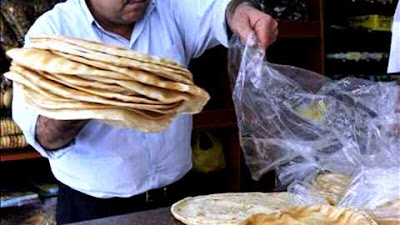Hussein Darwish wrote in Asharq Al-Awsat:
The announcement of the smuggling of bread to Syria, in light of the economic and living distress in Lebanon, reopened the file of cross-border smuggling, a decline last fall, and the rise in fuel subsidies in Lebanon.
In Al-Ayyam, the captain of the bakery owners’ union in Mount Lebanon, Antoine Seif, revealed a return to Syria, as well as flour, “calling on the Lebanese state to control this matter.”
Field sources in the northern Bekaa said to “talking about smuggling thousands of modern bread,” pointing to the price of bread in Syria “less than its price in Lebanon.” Farewell and wonderful from abroad, you are an unprofitable business. She said that the bread consumed by restaurants in Syria is sold in Lebanon by 10,000 Lebanese pounds, flying at the top of the house is 18,000 Lebanese pounds (half a dollar).
The sources spoke of smuggling small quantities of Lebanese flour to Syria, and it takes its way from the northern border strip in northeastern Lebanon, towards the villages of the countryside of al-Qusayr inhabited by Lebanese, going to Homs; These restrictions on the restrictions they impose on the Lebanese country, which is a good case in the export of flour to eastern Lebanon.
And Lebanon suffered last week from a shortage of bread, stocks of wheat stocks in warehouses and mills. The price of a bundle of bread also rose in parallel with the rise in the dollar exchange rate. Its price in bakeries reached 10,000 Syrian pounds (about 30 cents) and 12,000 pounds in distribution, although the price of flour is subsidized, due to the lifting of subsidies on fuel, sugar, yeast and nylon that are used in the manufacture and packaging of bread.
In the outskirts, in the north-east of Lebanon, trucks are now obliged to pass a huge Lebanese army checkpoint and smuggling activity has receded. Harbta town.
Security sources in eastern security in eastern and southern Africa said that this information indicates that this information indicates that the army and the ninth brigade “check the flour trucks and trucks on the road leading to the Syrian border,” illustrating the army’s drawings, “checking the drivers’ papers and their destination.” Flour should be transferred to any towns or bakeries, as part of the anti-ventilation plans.”
Some of them are potentially ready for reception in the country, and bear their name from the flour. The sources said that the matter "withdraws from gas shipments that go to the border areas, to combat their smuggling into the interior."
The smuggling activity began in Lebanon, after the removal of fuel subsidies, mainly; The most important activity in smuggling into Syria, in contrast to another activity from Syria to Lebanon, is the smuggling of livestock and vegetables.











0 Comments